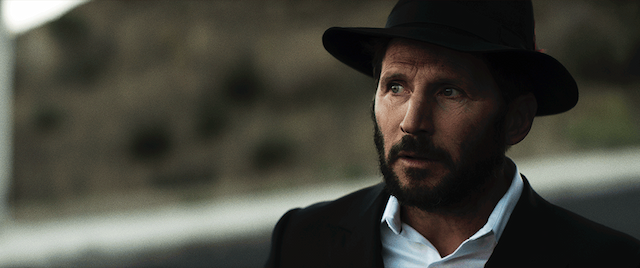Babylon Bee Editors Nod to Literary Classic with 'The Postmodern Pilgrim's Progress'

Babylon Bee managing editor Joel Berry
Known for its world-famous satirical news, The Babylon Bee is the most popular conservative Christian satirical news website in the world, generating more than 15 million visits per week.
Boasting headlines like “Shrinkflation: Costco Now Only Offering Normal-Sized Food” or “Biden Administration to Provide Grief Counselors at All Gas Pumps”, editor in chief Kyle Mann along with managing editor Joel Berry craft some of the most biting yet telling daily satirical content on the Internet.
Seeking to take their brand of humor beyond the bits and bytes of a daily website, the duo have authored a new book called The Postmodern Pilgrim’s Progress, a 21st Century take on the 1678 John Bunyan classic of a similar name. In its 224 pages, Mann and Berry track a millennial seeker traveling through space and time who experiences all of our modern vices but somehow learns some timeless virtues along the way.
To Purchase The Postmodern Pilgrim’s Progress:
I recently sat down with Berry to discuss the new book, why satire can sometimes be a delicate topic in the faith community, and why this type of humor is so important to modern Christianity.
What attracted or drew you to writing satire? To me, as a fellow journalist, satire takes a special person to write this kind of material.
I think I’m just naturally fluent in sarcasm for one. I enjoy that. Also, I think I really got excited at the idea of maybe a more sanctified missional outlet for my sarcasm. (Laughs)
I think what I really enjoyed about it was that all the things that I was always thinking about, these issues, these fundamental issues of worldview, truth and lies, good and evil, good philosophies, bad philosophies, good theology and bad theology. I was able to kind of condense all those things that I was thinking about into a pithy, witty one-two punch of a headline. Those headlines have a way of cutting through the noise. That, in a way, may be a book or an article. Our culture has a short attention span. I think when you can make a point in a humorous way that catches people off guard, I think you reach people that you otherwise wouldn’t. That was very gratifying for me to be able to put that stuff out there and have people (respond). I think my most gratifying moments are when we have atheist or leftist people who aren’t our normal crowd reach out and say they really love our satire or that we’ve really made them think and reconsider. So, it’s the most rewarding work I’ve ever done. I’m really living a dream.
I’ve had conversations with various movie executives, actors, and actresses over the years about why comedy has to walk such a fine line in the faith movie space. Basically, their answer is the belief they don’t want to offend anyone. It seems if you are not offending one group, you’re likely ticking off another when you’re doing Christian comedy. So, taking this to faith-based satire, I’ve got to believe that satire in the faith space must also take this notion to new heights. What are your thoughts on this?
I think the Millennial generation that grew up in the 1980s and 1990s, are very much used to, and even comfortable with Christians being the butt of the joke. We always kind of have been the butt of the joke. And so, I think it’s not something that bothers us too much.
For people in their thirties and older, whose faith has survived all the upheavals, cultural changes and disappointments of the evangelical world, I think we’ve come to see how solid a foundation our faith rests on. That gives us the confidence to be able to turn the cans toward our own tribe. We know that our worldview can stand up to it. And so, we kind of issue the same challenge to everyone else. Can your worldview stand up to the jabs pointed in your direction as well?
You have to be able to laugh at yourself. There is so much that is funny, absurd and ridiculous about Christian culture, about Christians, and just about ourselves, if we’re being honest. We’re all a little ridiculous in our attempts to please God.
I think it’s important for Christians and everyone for that matter to laugh at themselves occasionally and be self deprecating. Why is satire and/or comedy so important to modern Christianity?
I think we’ve reached this point in our culture where we call it a post-truth culture. (You could also call it) a post-reason, post-logic culture. I think it’s a very hard ask for a lot of people to ask them to sit down and parse through reasoned arguments, evidence, and things like that. I think that stuff is important, but I think what satire does is it communicates truth in a way that can sometimes get you to accidentally acknowledge the truth even if you don’t mean to, because you’re laughing at the joke. Oftentimes we laugh at something because it’s true. Something is funny because it is true.
When that truth is communicated, whether we are in that tribe, whether we agree with the point of view of the comedian or not, in that laughter there’s something true and something pure about that laughter. So, in this postmodern world, satire has become a very effective way to communicate truth, but also to kind of break down the barriers, and help people see that as Christians, we can laugh at ourselves. We like to have fun. We’re not scary. Let’s have a conversation.
What do you look for in finding something to write about for the Babylon Bee? Are there any topical areas that are of critical importance to you? And second, are there any topics that are off limits?
A lot of our content is very timely in the sense that we’re responding to a news headline that came out an hour ago. We found that just to keep up and keep traffic coming, we have to be very in the moment. But we try to mix that up with more evergreen stuff. So, 70% of that stuff might be of the moment, or current events. The other 30% might be more evergreen stuff related to theology, culture, truth, or worldview. Pretty much nothing is off limits. Obviously, as Christians, the only off limit thing is going to be topics that are blasphemous.
A lot of our successes come from the fact that we touch things that no one else is, that a lot of people are afraid to joke about. It’s a weird feeling to be (in that spot).
Let’s talk about your new book, The Postmodern Pilgrim’s Progress. From my perspective, this isn’t exactly the first book that I would satirize. First off, it was published in 1678. It’s an allegory written by John Bunyan, and is legendary and beloved. And it’s absolutely chock full of valuable life lessons. Why tackle this one?
(Laughs) Well, it’s funny. The idea of writing a modern version of The Pilgrim’s Progress had been in (co-author) Kyle’s (Long) mind for many years. He had started a few times and hadn’t really been able to make it work. For both of us, we love The Pilgrim’s Progress and it’s been such an influential book. However, I wouldn’t compare it too closely to The Pilgrim’s Progress. It is a masterpiece while we’re kind of just playing around in comparison. But I think what we wanted to do was tell a story that reflected the modern Christian journey and some of the things that we’ve experienced. I think Christianity is in this weird place, at least in America. Evangelicalism, Christianity, whatever you want to call it, seems a little bit lost. A lot of the leaders that we grew up with and a lot of the musicians that we loved have fallen away, lost their faith entirely, or have been embroiled in scandal.
And a lot of our peers have gone through these deconstructions, or left the faith entirely. So, we wanted to tell a story that reflected what it looks like to follow God in a world where the Christian establishment, the Christian leaders disappoint you. Horrible atrocities happen that don’t seem to have an explanation. You’ll find in this book that a lot is left unanswered. The why question for a lot of these terrible things that happen isn’t answered. As Christians, a lot of times, we’re not called to try to understand. We’re called to simply remain faithful, take the next step toward Jesus and trust Him with the faith of a child. I think it’s kind of a story for our time in that sense. A lot of us are in that same place and God simply calls us to be faithful. Keep following me as everyone else follows, watch them fall away. And when everyone’s arguing with each other, keep your eyes on me and keep taking those little steps.
From my standpoint, I think this is an incredibly clever and creative literary work. What was your greatest challenge in writing it?
(Laughs) Well, we wanted to add something to the story beyond it just being kind of a straight retelling of The Pilgrim’s Progress. Kyle and I really love sci-fi. We really love Douglas Adams, author of The Hitchhiker’s Guide to the Galaxy. A lot of people have commented that you can tell that we were heavily inspired by that book. In this book, we have this narrator where it doesn’t explicitly say he’s an angel, but he’s a creation of God. He kind of doesn’t understand humans. He kind of looks down on them. He’s a bit of a sociopath.
And so he’s kind of observing, and we kind of go on a journey with this narrator as he watches God work in the life of this main character, Ryan. And by the end, he’s a little bit in awe, watching as God works with this seemingly insignificant young man. We pepper it with a lot of Babylon Beat-isms. We have footnotes where he’ll go off on a tangent about some movie reference, some silly thought that he has, or some reference to another universe. There’s a multiverse element in here which was really fun. We wanted to include the multiverse element in particular because interesting multiverse stories seem to be really big right now.
We wanted to tell a multiverse story that goes in the opposite direction. We have a character that starts out as a nihilist and goes on this journey to find meaning through this multiverse. And I like the idea of what if God could have easily made a multiverse? It doesn’t matter. The story’s still the same, God is still on the throne, and we can trust Him. So, that was kind of a fun thing to play with in the book.
Speaking of your main character, Ryan Fleming, how is he the same as Christian from The Pilgrim’s Progress and how is he different?
Oh, that’s interesting. He is the same in the sense that you’ll often find him kind of bumbling off the path and into mischief. He makes a lot of mistakes. He’s different in the sense that we gave him more of a backstory. He does have this tragedy in his life. He’s mad at God. There’s something personally that he’s working through as the story plays out. We really wanted to emphasize that there wasn’t much to this guy. He’s kind of an every man. He hasn’t really accomplished much in life, which I think makes it more exciting when you kind of watch how God works in his life.
What’s your greatest hope for the book?
I hope that it helps to strengthen and encourage Christians who are a little bit discouraged. We really tried to go after atheism, humanism, and the appeal of those philosophies that are drawing Christians away right now. We try to sympathize with those people and those arguments. I would hope that any Christian who is walking through tragedy, who is walking through times of questioning, temptation, or disappointment, that this book would encourage and remind them of the bigger story that’s playing out in their life and hopefully give them some hope and strength to keep walking.










